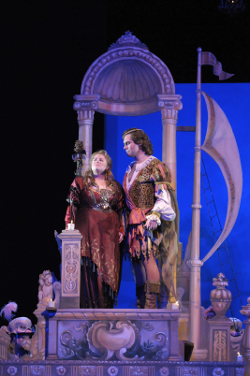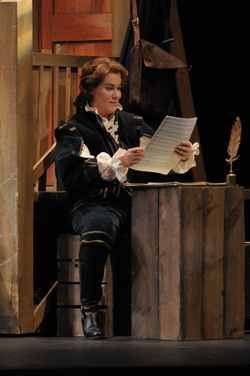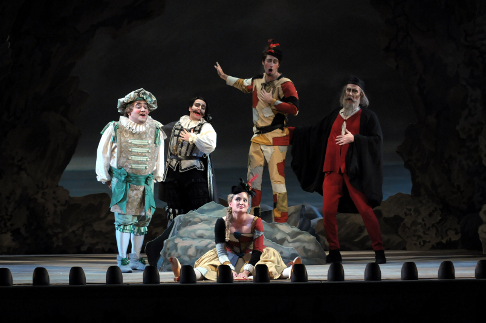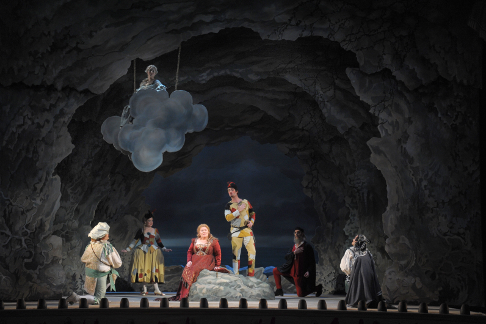Recently in Performances
English Touring Opera are delighted to announce a season of lyric monodramas to tour nationally from October to December. The season features music for solo singer and piano by Argento, Britten, Tippett and Shostakovich with a bold and inventive approach to making opera during social distancing.
This tenth of ten Live from London concerts was in fact a recorded live performance from California. It was no less enjoyable for that, and it was also uplifting to learn that this wasn’t in fact the ‘last’ LfL event that we will be able to enjoy, courtesy of VOCES8 and their fellow vocal ensembles (more below …).
Ever since Wigmore Hall announced their superb series of autumn concerts, all streamed live and available free of charge, I’d been looking forward to this song recital by Ian Bostridge and Imogen Cooper.
Although Stile Antico’s programme article for their Live from London recital introduced their selection from the many treasures of the English Renaissance in the context of the theological debates and upheavals of the Tudor and Elizabethan years, their performance was more evocative of private chamber music than of public liturgy.
Evidently, face masks don’t stifle appreciative “Bravo!”s. And, reducing audience numbers doesn’t lower the volume of such acclamations. For, the audience at Wigmore Hall gave soprano Elizabeth Llewellyn and pianist Simon Lepper a greatly deserved warm reception and hearty response following this lunchtime recital of late-Romantic song.
For this week’s Live from London vocal recital we moved from the home of VOCES8, St Anne and St Agnes in the City of London, to Kings Place, where The Sixteen - who have been associate artists at the venue for some time - presented a programme of music and words bound together by the theme of ‘reflection’.
'Such is your divine Disposation that both you excellently understand, and royally entertaine the Exercise of Musicke.’
‘And there was war in heaven: Michael and his angels fought against the dragon; and the dragon fought and his angels, And prevailed not; neither was their place found any more in heaven … that old serpent … Satan, which deceiveth the whole world: he was cast out into the earth, and his angels were cast out with him.’
There was never any doubt that the fifth of the twelve Met Stars Live in Concert broadcasts was going to be a palpably intense and vivid event, as well as a musically stunning and theatrically enervating experience.
‘Love’ was the theme for this Live from London performance by Apollo5. Given the complexity and diversity of that human emotion, and Apollo5’s reputation for versatility and diverse repertoire, ranging from Renaissance choral music to jazz, from contemporary classical works to popular song, it was no surprise that their programme spanned 500 years and several musical styles.
The Academy of St Martin in the Fields have titled their autumn series of eight concerts - which are taking place at 5pm and 7.30pm on two Saturdays each month at their home venue in Trafalgar Square, and being filmed for streaming the following Thursday - ‘re:connect’.
The London Symphony Orchestra opened their Autumn 2020 season with a homage to Oliver Knussen, who died at the age of 66 in July 2018. The programme traced a national musical lineage through the twentieth century, from Britten to Knussen, on to Mark-Anthony Turnage, and entwining the LSO and Rattle too.
With the Live from London digital vocal festival entering the second half of the series, the festival’s host, VOCES8, returned to their home at St Annes and St Agnes in the City of London to present a sequence of ‘Choral Dances’ - vocal music inspired by dance, embracing diverse genres from the Renaissance madrigal to swing jazz.
Just a few unison string wriggles from the opening of Mozart’s overture to Le nozze di Figaro are enough to make any opera-lover perch on the edge of their seat, in excited anticipation of the drama in music to come, so there could be no other curtain-raiser for this Gala Concert at the Royal Opera House, the latest instalment from ‘their House’ to ‘our houses’.
"Before the ending of the day, creator of all things, we pray that, with your accustomed mercy, you may watch over us."
The doors at The Metropolitan Opera will not open to live audiences until 2021 at the earliest, and the likelihood of normal operatic life resuming in cities around the world looks but a distant dream at present. But, while we may not be invited from our homes into the opera house for some time yet, with its free daily screenings of past productions and its pay-per-view Met Stars Live in Concert series, the Met continues to bring opera into our homes.
Music-making at this year’s Grange Festival Opera may have fallen silent in June and July, but the country house and extensive grounds of The Grange provided an ideal setting for a weekend of twelve specially conceived ‘promenade’ performances encompassing music and dance.
There’s a “slide of harmony” and “all the bones leave your body at that moment and you collapse to the floor, it’s so extraordinary.”
“Music for a while, shall all your cares beguile.”
The hum of bees rising from myriad scented blooms; gentle strains of birdsong; the cheerful chatter of picnickers beside a still lake; decorous thwacks of leather on willow; song and music floating through the warm evening air.
Performances

23 Jan 2012
A Noteworthy Ariadne auf Naxos, Chicago
Richard Strauss’s opera Ariadne auf Naxos presents challenges in casting not only because of the vocal line and identity associated with individual characters but also because of its nature as a self-comment on the musical stage and the requisite dramatic skills thus needed.
Lyric Opera of
Chicago succeeds in meeting these challenges on both accounts in its recent
revival. The title role was sung by Amber Wagner, the Composer in the Prologue
by Alice Coote, Zerbinetta by Anna Christy, and the god Bacchus by Brandon
Jovanovich. Other roles showing strong performances include Eike Wilm Schulte
as the Music Master, Matthew Worth (debut) as Harlekin, and Nili Riemer
(debut), Jamie Barton, and Kiri Deonarine (debut) singing the three nymphs
Naiad, Dryad, and Echo respectively. Sir Andrew Davis conducted the Lyric Opera
Orchestra in a fluid and moving performance of Strauss’s score.
 Alice Coote as the Composer
Alice Coote as the Composer
During the instrumental prelude to the first part the audience is presented
with preparations for a seventeenth-century production. Scaffolds, doorways to
dressing rooms, props and primitive dramatic machinery clutter the stage in
this self-reflective Prologue to the varieties of entertainment scheduled to
follow. The performers of the evening run about their tasks until the first
exchange of dialogue between the Music Master and the Major Domo of the palace.
Eike Wilm Schulte’s fluency and projection of both spoken and sung German are
exemplary as needed to steer a course of diplomacy between the Major Domo’s
demands and the sensitivity of his pupil, the Composer. Schulte’s
legato and attention to pitch in distended notes enhanced his
desperation in trying to fulfill multiple roles. In the speaking role of the
Major Domo David Holloway cut an appropriately pompous figure while relaying
his maser’s whims in a bureaucratic monotone. When the Composer, visible in
diligence at his desk from earlier in the Prologue, begins to react to news
from the Music Master, Alice Coote’s voice blooms with passion and devotion
to the musical art. Her wide range with a fluid transition from low to secure
top notes was used skillfully to convey the Composer’s consternation and
disbelief that his serious opera “Ariadne” was to be mixed with low comedy.
 Anna Christy as Zerbinetta with commedia dell’arte troupe
Anna Christy as Zerbinetta with commedia dell’arte troupe
Phrases such as “Allmächtiger Gott” and “Nach meiner Oper ein lustiges
Nachspiel!” [“Almighty God” “A humorous interlude after my opera!”]
showed effective use of Coote’s dramatic sense of vocal transition. As the
Prima Donna and Tenor for the opera plead the importance of their own roles,
the Composer swirls in further controversy. Only after he learns that his opera
must be performed simultaneously with the commedia, Zerbinetta and
Her Four Lovers, does attention focus primarily on the personalities of
the Composer and Zerbinetta. Ms. Christy had portrayed a sprightly, playful
figure until this point. Her own transformation into a counterpoint for the
Composer is not only convincing dramatically, but it is also demonstrative of a
vocally altered character. The Composer, in turn, declares that he would prefer
to toss his precious score into the fire, detailed excitingly by Coote with
ascending pitches on “Lieber ins Feuer.” During the ensuing duet both
characters seem to lose their animosity, with the Composer’s interest clearly
in acceleration. Although he continues to take himself seriously, Zerbinetta
makes him see everything, as Coote declares urgently, “mit anderen Augen”
[“with different eyes”]. During their interchange Davis provided excellent
orchestral support with the woodwinds standing out especially in expressive
lines parallel to those for the voice. Coote’s final aria, “Musik ist eine
heilige Kunst,” [“music is a holy art”] was delivered as a heartfelt
soliloquy with effectively held notes emphasizing the Composer’s sincere
dedication to his art. When pulled out of this self-absorption by
Zerbinetta’s whistle and calls to prepare her troupe, Coote ended the
prologue with dramatic expressiveness on “frieren, verhungern, sterben”
[“to freeze, to starve, to die”] as reactions to this unexpected
forthcoming medley.
In the prelude to the opera proper Davis’s conducting brought out the
rich, orchestral colors with horns balancing off the nicely integrated string
playing. The three nymphs, who introduced the act with questions and
repartee on Ariadne’s emotional and physical state, sang distinctly
as a trio with vocal decorations blending fittingly. Ms. Wagner’s entrance
began with solidly produced low notes followed by equally impressive and
emotionally charged high pitches on “Mein Kopf ist leer” [“My mind is
empty”]. Wagner’s dramatic approach to “Dies muß ich finden” [“I
must find this”] prepared Ariadne’s personality for the aria “Es gibt ein
Reich” [“There exists a kingdom”]. In this performance Ms. Wagner drew on
her preceding vocal characterization and added moments such as a deep emphasis
on “Totenreich” [“realm of death”] contrasting with an impressive high
pitch on “Hermes, stiller Gott.” When she described being alone, “ganz
allein,” with a touching piano, it further emphasized her brittle
emotional state, since this followed on her dramatic rubato at “von
meiner Höhle” [“from my cave”]. Her conclusion to the aria left an
impression of her character’s yearning and incompleteness. Immediately after
this piece Zerbinetta and her troupe dominate the stage but their attention is
now focused on sympathy with Ariadne’s plight. Matthew Worth displayed an
appropriate physicality as Harlekin while he sang an exquisite lyrical appeal
to the inattentive Ariadne.
 Scene from Ariadne auf Naxos
Scene from Ariadne auf Naxos
Of course one of the highlights of the operatic segment of Ariadne auf
Naxos is Zerbinetta’s aria “Großmächtige Prinzessin,” in which the
innermost feelings of the commedia performer answer the question,
“Are we not both women?” Ms. Christy sang the challenging role with
alternating glee and wistfulness: her voice is a comfortable fit for the many
roulades and interpolated decorations. The effect taken on “treulos”
[“faithless”] and trills executed just before “Als ein Gott kam jeder
gegangen” [“Every man approached me like a god”] were a tasteful and
knowing cap on this splendid performance of the aria.
Once the nymphs announce the arrival of Bacchus [“Ein schönes Wunder
(“A beautiful miracle”)], his cries of “Circe” from the distance match
their excitement. From the start of his role Mr. Jovanovich was always on pitch
with notes produced forte when dramatically needed and piano
when expressing his appeals to Ariadne. His cries of “Circe” intensified
without a hint of strain just as he sang diminuendo on “Zauberin”
[“magical being”] when voicing his attraction. The final extended duet
celebrating the love between Ariadne and Bacchus as performed by Wagner and
Jovanovich was sufficiently moving to count as the “schönes Wunder” that
the nymphs had anticipated.
Salvatore Calomino



